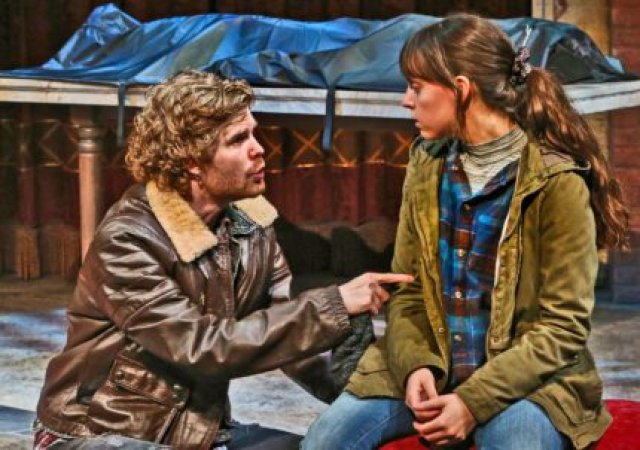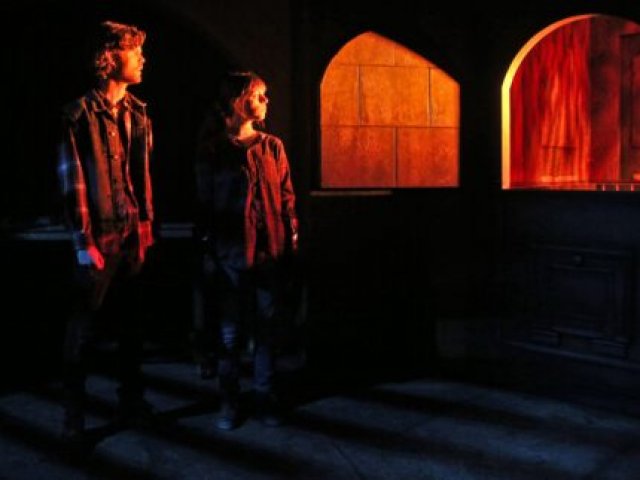The Science of Leaving Omaha
World Premiere at Palm Beach Dramaworks in South Florida
By: Aaron Krause - Feb 12, 2023
In his classic poem, Harlem, Langston Hughes wondered what happens to a “dream deferred.” In particular, he wrote: “Does it dry up like a raisin in the sun? Or fester like a sore—and then run? Does it stink like rotten meat? Or crust and sugar over—like a syrupy sweet? Maybe it just sags like a heavy load. Or does it explode?”
Indeed, in Carter W. Lewis’s slyly funny, sympathetic, and ultimately heartbreaking new play, The Science of Leaving Omaha, Baker must feel as though he has witnessed all his dreams and hopes explode in a cloud of smoke. Apparently, they are as dead as the body of his wife, to whom he was married for 27 hours before someone killed her.
While Lewis shows sympathy for Baker, he does not condone what the 21-year-old man has done. And the playwright does not ask us to excuse Baker’s bad deeds. Instead, Lewis asks us to consider what Baker has been through, and acknowledge his challenges, as well as the hardships that others like him encounter. Certainly, there are many people these days who find themselves in situations similar to Baker’s.
Undoubtedly, Lewis takes us on an emotional journey in The Science of Leaving Omaha. It is a layered play about the power of words and the desire that everyone has to matter and to be acknowledged.
The thought-provoking piece is experiencing its world premiere in a strong professional production by Palm Beach Dramaworks (PBD). The production runs through Feb. 19 in the nonprofit theater company’s intimate playing space in West Palm Beach.
Bruce Linser, manager of PBD’s Dramaworkshop, whose aim includes finding and developing new plays, directs the production with sensitivity and attention to detail. Clearly, Linser and a talented cast of actors, all new to PBD, have found the humanity in the play’s characters.
Lewis, the winner of several national playwrighting awards, writes vividly, unapologetically, and makes his play relevant to today.
Speaking of now, the piece takes place during the present in a small basement crematorium of the Belladonna Funeral Home in Omaha. When the play begins, it is about 2 a.m., and 18-year-old funeral home worker Iris is at her job filing papers in the basement crematorium. Suddenly, she hears pounding on the door, but does not answer. Not long afterwards, Baker breaks in through one of the small windows. He had been taking Ubers around Omaha, desperately searching for his wife’s body.
True, Baker never had a chance to say goodbye to his late wife, Ruth-Ellen. However, Baker’s needs on this day obviously extend beyond chances to say goodbye during visitation hours and a funeral.
Throughout the play, Lewis sensitively paints a portrait of not just a shocked mourner, but a lost, broken soul. Happiness and success have repeatedly eluded him, and society may have failed him. Chances are, you know someone like Baker or Iris.
Baker and his wife had plans. Specifically, the recently-married couple intended to move to New Mexico and raise alpacas. However, after Baker robbed a bar, someone shot at the couple during their attempted getaway on a Ducati trail bike. Unfortunately, the bullet struck Ruth-Ellen, and killed her. Baker thought she jumped off the bike before he turned around and saw authorities placing her corpse into a body bag.
After Baker breaks into the basement crematorium, he is desperate. For instance, he demands to know specifics about the cremation process and information about embalming. He pleads with Iris, who is not a funeral director, to look the information up in books that the facility keeps.
Clearly, Baker needs something. However, maybe it is not even clear to him what he seeks.
As Baker grows more desperate, Iris becomes frightened that the intruder, who already robbed a bar at gun point, will harm her. Also, we begin to see how Baker and Iris are similar. Namely, both feel that they have hit a dead end in a city where opportunities are scarce. Baker and Iris feel trapped and wish to escape Omaha.
The pair are working class, poor young people whom society has swept aside. They grew up in broken homes and may have lacked access to quality education. Baker planned to play baseball and study at a university through a scholarship, but “when I took the entrance exams – turned out my high school didn’t really teach me much.”
Of course, getting into college does not guarantee you a job these days, as Iris points out.
True, Iris is employed, while Baker is not, although he worked different jobs in the past. Still, from the play’s beginning, it is clear that Iris is far from happy. In fact, when the play opens, she is proofreading an essay she needs to write in order to get back into school (she dropped out).
“Living here is not a dream,” she wrote. “It’s like when someone tells you Zorinsky Lake is froze over ‘n good for walkin’-on and as soon as you start walkin’ -on it, you fall through, and you die. Or maybe you survive while you’re drowning; that would pretty much be what it’s like around here. Zorinsky Lake is a really suck-ass lake.”
While this is obviously a dark play, Lewis balances its bleakness with humor and hope. Indeed, despite the challenges that Baker and Iris have faced and continue to face, they cling to a faint sense of hope that better days lie ahead.
Also, the playwright includes humor, which keeps this play from being depressing.
“I been here almost three years now, and…this ain’t never happened not even once,” Iris tells Baker about what he has put her through. “Sometimes at night a body twitches and that’s about it. That’s called cadaveric spasm by the way, it happens sometimes, but Ruth-Ellen hasn’t done any of that, as far as I know she’s been real ladylike.”
Other moments of humor come when Baker, and eventually Iris, address Ruth-Ellen as though she were alive.
Perhaps if Lewis included flashbacks during which Ruth-Ellen were alive and happily married to Baker, we would be able to identify with them even more. As it stands, we only see Ruth-Ellen alive at the play’s end and she does not speak. By the way, the ending, while fantastical, is touching and poetic.
Offstage characters who come alive through Lewis’s writing include “Mrs. B,” Iris’s boss. As Lewis depicts her, she is the kind of caring boss just about everybody would wish to have. No doubt, she is a mentor to Iris.
In addition to Iris and Baker, the final live character that we meet is Sally. She is a security guard tasked with keeping Belladonna Funeral Home, among other places, safe. Lewis includes enough information about “Security Sally” to humanize her.
Merrina Millsapp plays Sally with a commanding, no-nonsense aura. In addition, the performer convincingly conveys her emotional pain. Clearly, as Millsapp portrays her, Sally never thought she would have to pull out her gun, as Baker forces her to do in the play. This upsets her, and the shock is evident in her face and in her voice.
Meanwhile, Georgi James instantly makes Iris likable. Therefore, it is easy to pull for her. The short performer, with dark eyes and long dark hair worn in a ponytail, speaks in a high-pitched, sweet voice. It might make you mistaken her for an adolescent.
James imbues Iris with a cheery, polite disposition in the beginning. You sense a contentedness about her. She may not like where she is working, but she is making the best of it.
While James makes Iris likable, she also imbues her with a believable nervousness that borders on panic. At one point, she convincingly cries and you want to comfort her.
Opposite James, Nicholas-Tyler Corbin turns Baker into a desperate mess. When we meet Corbin’s Baker, his hair is disheveled, his jeans are torn, he is unshaven, and his shirt is untucked. In fact, there is something almost feral about Corbin’s Baker in the beginning.
Corbin forcefully yet naturally conveys a sense of urgency. There are times when Corbin’s Baker explodes. First, his leg starts moving up and down. Then, you hear his breathing get louder and faster. Finally, he gets up and screams. He sounds like a wounded, starved, and trapped wild animal.
Behind the scenes, scenic designer Michael Amico has created a small, dark space with bricks. With the exception of a couple of small, barely noticeable windows, the place is enclosed, creating a claustrophobic feeling.
The space includes a photo of Jesus, family photos, and a particularly bleak-looking door to the actual cremation chamber. The grey, dreary-looking door contrasts markedly with a bright, intricately-patterned couch, chair, and rug. The stark contrast might symbolize the wide gulf between the rich and the poor such as Baker and Iris.
Also, behind the scenes, lighting designer Kirk Bookman deftly contrasts realism from nonrealism, while Brian O’Keefe designed the character-appropriate costumes.
The Science of Leaving Omaha is a funny and touching piece of live theater that has a bright future ahead of it. Perhaps by spending time with these characters, we can begin to see things from their point of view and acknowledge the challenges that they face.
These characters do not want special treatment. They just want to matter and be acknowledged.
Don’t we all?
The Science of Leaving Omaha runs through Feb. 19 at Palm Beach Dramaworks, 201 Clematis St. in West Palm Beach. Show times are 7:30 p.m. Wednesday and Thursday; 8 p.m. Friday and Saturday, as well as 2 p.m. Wednesday, Saturday and Sunday. For tickets, call (561) 514-4042 or go to palmbeachdramaworks.org.


